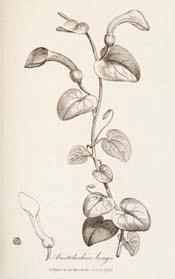
Botanical.com Home Page

|
Birthwort
(Aristolochia longa)
Click on graphic for larger image
|
Birthwort
Botanical: Aristolochia longa (LINN.)
Family: N.O. Aristolochiaceae
---Synonym---Long-rooted Birthwort.
---Part Used---The root.
---Habitat---Southern Europe and Japan.
---Description---There are several species of the Aristolochias used by herbalists in India. The root is spindle-shaped from 5 cm. to 3 dm. in length, about 2 cm. in thickness, fleshy, very brittle, greyish externally, brownish-yellow inside, bitter and of a strong disagreeable odour when fresh.
---Constituent---Aristolochine.
---Medicinal Action and Uses---Said to be useful as an aromatic stimulant in rheumatism and gout and for removing obstructions, etc., after childbirth. Dose, 1/2 to 1 drachm of the powdered root.
---Other Species---
Aristolochia, cymbifera from Brazil and Mexico is said to have medicinal properties similar to the official species. Butte affirms it is a depressant to the sensory nerve centres and is useful in neuralgia and pruritis; it was formerly considered alexiteric, antiparalytic, antiperiodic and aphrodisiac.
A. Argentina root is used in that republic as a diuretic and diaphoretic, especially for rheumatism.
A. Indica is used as an emmenagogue, antiarthritic, stomachic, purgative and vermifuge, and in the East Indies is used for similar purposes as the American and European species.
A. Sempervirens is said to be used by the Arabians as a remedy against the poisonous effects of snake-bite.
A. Foetida in Mexico is used as a stimulant to foul ulcers.
A. serpentaria used in bilious, typhoid and typhus fevers, smallpox, pneumonia, amenorrhoea and fevers of a septicaemic type. It is often given in combination with Peruvian Bark, rendering it more active and preventing ill effects on the stomach. It is also used in North America, as are several other varieties of the species, as an alexiteric and for the bites of mad dogs.
[Top]
Common Name Index
A MODERN HERBAL Home Page
Bear in mind "A Modern Herbal" was written with the conventional wisdom of the early 1900's. This should be taken into account as some of the information may now be considered inaccurate, or not in accordance with modern medicine.
© Copyright Protected 1995-2024 Botanical.com
|

